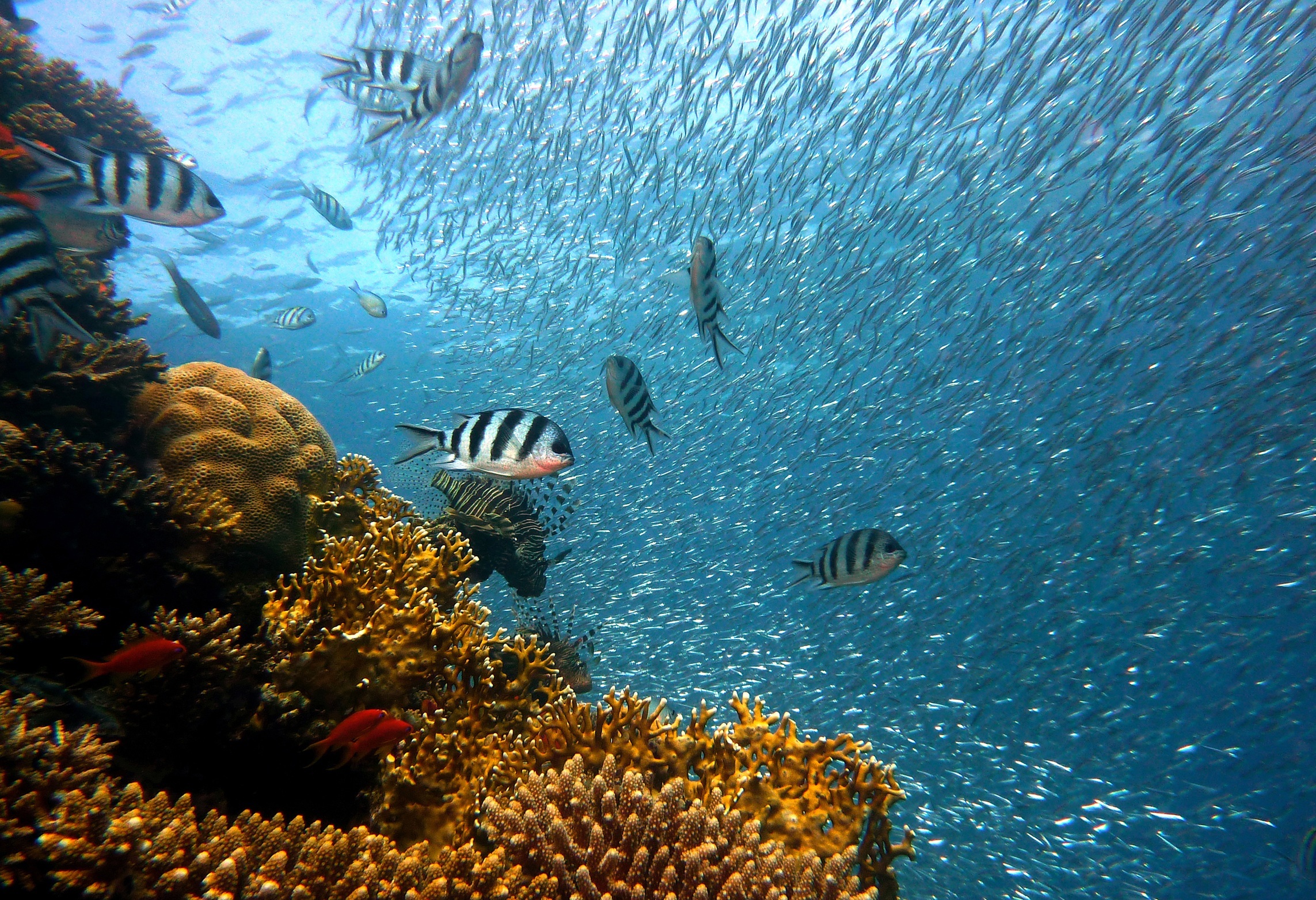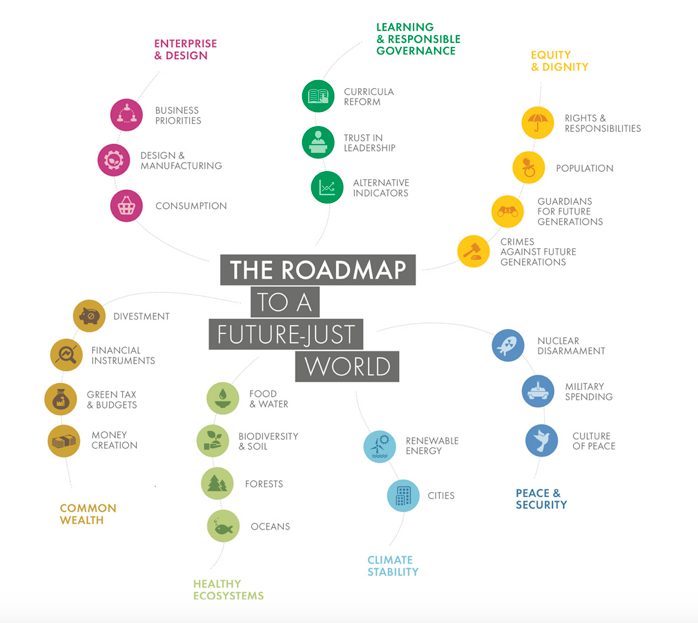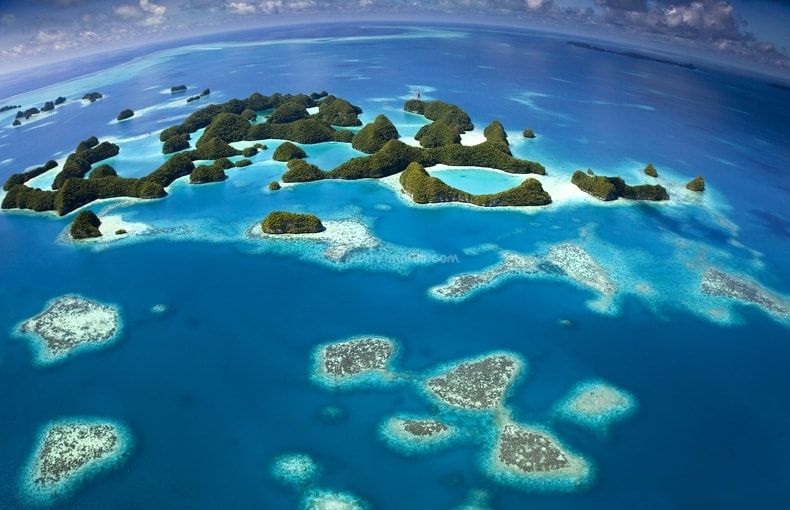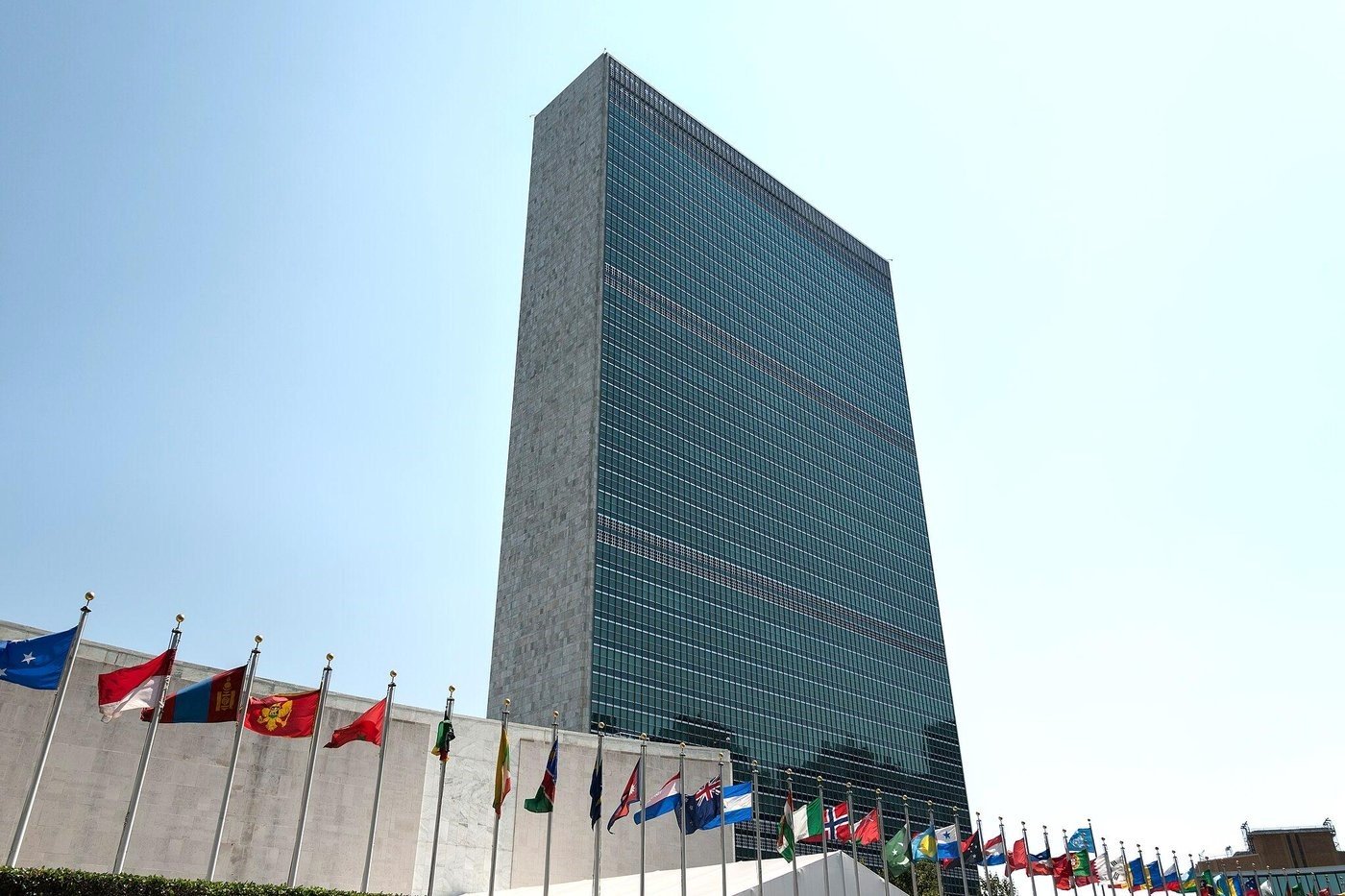The consequences of our decisions and actions will have greater and longer-term consequences than ever before. There are many signs that the damage to Mother Earth is now approaching irreversible tipping points, systems are already disintegrating and degenerating, overwhelming the resilience of the natural environment and threatening our survival. The World Future Council has identified a range of existing proven, exemplary policies which form the Global Policy Action Plan, to provide a coherent, interconnected policy guide to overcome the unprecedented emergency our civilisation faces.
We are far beyond the complacencies of ‘why’ we must act – today, we need to know ‘how’ we get there.
If we are to survive, the journey ahead is inevitable, but we need the tools to go further, faster. The Action Plan does just that. It offers a collection of well researched, holistic, policy examples that offer a practical and sustainable pathway, embracing a future-just perspective, bringing long lasting solutions. We can learn from these pioneering policies, replicate them elsewhere and build on their success stories.
 In the Photo: Visual Representation of the Global Action Plan Photo Credit: World Future Council ©
In the Photo: Visual Representation of the Global Action Plan Photo Credit: World Future Council ©
Investing in the Long-term
During the painstaking, three-year formal negotiating process to agree on the Sustainable Development Goals, ‘leave no one behind’ became the assumed mantra, the instant headline in a hashtag world to help simplify and pledge an underlying commitment to a complex and often overwhelming agenda. The poor, the marginalized, people in vulnerable situations and living on the edge of society come to mind. Those are the voiceless and forgotten. Yet, what of future generations? They are also without a voice, and for whom full enjoyment of their human rights looks increasingly uncertain.
The transformational nature of the 2030 Agenda must be supported by a new mindset which challenges current patterns where short-term interests often override the wellbeing of future generations. It is after all, the decisions made today that will affect them. Changes are needed to address the challenges posed by climate change, environmental destruction, extreme poverty and the widening gap between rich and poor, all of which pose enormous risks, to present generations, and worsening still to create a very unstable planet for future generations too.
Recommended Reading: “INVESTING IN ALL CHILDREN: TOWARDS EQUITABLE, INCLUSIVE, AND SUSTAINABLE DEVELOPMENT”
Ending poverty – a key part of the 2030 Agenda, is as much about future generations as present day. People cannot think and act long-term if their daily life is an existential struggle. Today, the impacts of climate change are most heavily felt by the poorest, threatening people’s basic rights such as the right to food, water and shelter on a daily basis.
As a result, much of the world’s population is prevented from developing sustainably in a way that doesn’t compromise future generations.
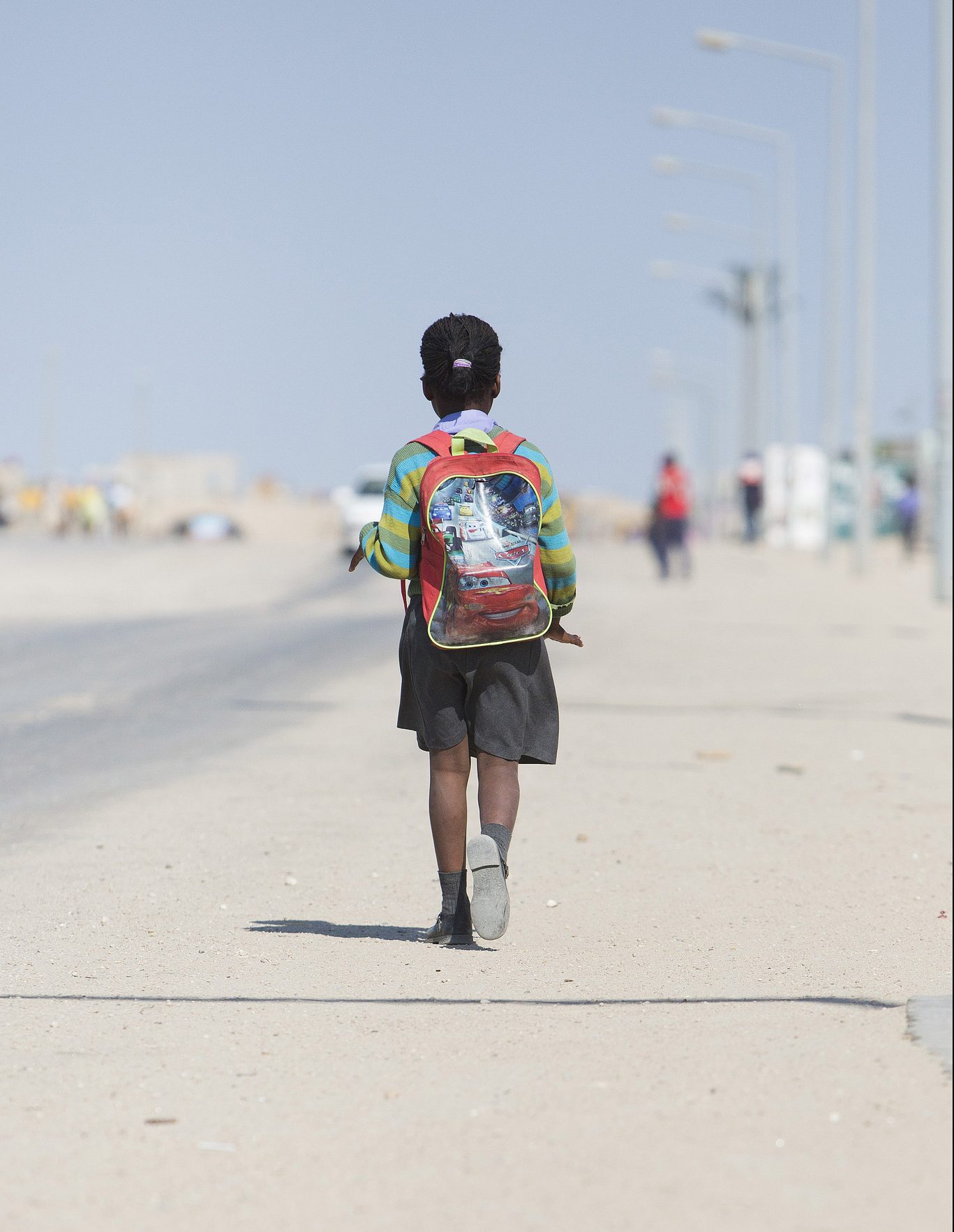
Photo Credit: World Future Council ©
The 17 goals and 169 supporting targets which comprise the Sustainable Development Goals, reflect the global response to a complex set of interlinked and connected challenges. Some would say the agenda is contradictory and incompatible in places. Future generations are recognized early on in the 35 page document:
Yet this intention presents nothing new. Since 1946, the international community has marked in numerous international treaties and conventions the need to recognise the interests of future generations. Over 20 national constitutions enshrine the needs of future generations. Yet, the warnings of the Brundtland Report are as urgent today as they were in 1987. The absence of action since Brundtland has also meant the dangers for the future are fast encroaching and rushing backward, to the point that thousands of the vulnerable and living on the margins are facing immediate threats to their survival. Innovative and far-reaching measures that go beyond the rhetoric will be needed if we are to truly deliver our commitments to future generations.
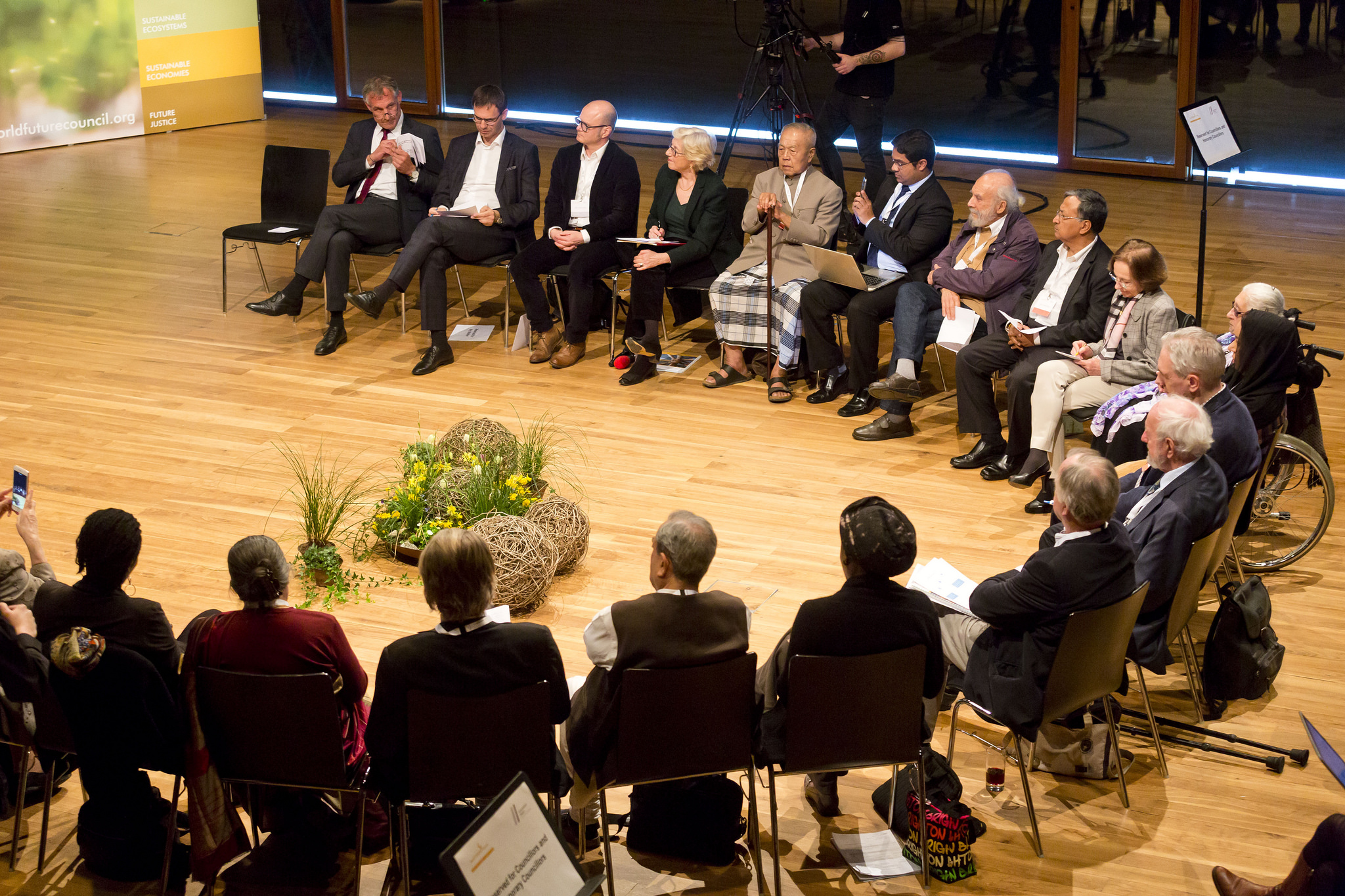
In the Photo: Opening Session at the World Future Forum, Bregenz March 2017, Kongresskultur Bregenz © Photo Credit: Dietmar Mathis.
To unpick the Sustainable Development Goals in order to prioritize one over another undermines the vision of the 2030 Agenda. The World Future Council was established with this very same vision. In identifying exemplary, existing good practice and policies on the long-term, we recognize the interconnected layers of the challenges we face, and therefore the integrated and holistic nature of the solutions. We seek to work beyond the siloes, applying a systems-based approach to our work. We encourage policymakers, and parliamentarians, with whom we work most closely, to do the same – knowing that this raises fundamental and underlying questions to our current governance structures. In this spirit, we seek to embolden and inform policy makers on the challenges of implementing the SDGs. Quite simply, if we are to be successful in meeting the goals, we need to do things differently.
Good governance is perhaps the single most important factor in eradicating poverty and promoting development. – H. E. Mr. Kofi Annan, former Secretary-General of the United Nations
BEST POLICY SOLUTIONS FOR A SUSTAINABLE FUTURE
The following selection of landmark policies from Zanzibar, Maryland, Costa Rica, Rwanda and Palau, help to illustrate how rights are also counterbalanced by responsibilities. Governments must ensure that respect for human rights is not an empty proclamation but an unquestionable practice. Yet, we too have a responsibility to preserve our planetary home for our children and generations to come. There is no right to the impossible and without effective planetary stewardship, hard-fought rights will become impossible to maintain on a ravaged planet. An interconnected approach to decision-making, shown throughout the acts discussed below, which integrate the respect of fundamental human rights, will ensure that the implementation of sustainable solutions leads to urgent progress in all our causes.
Zanzibar Children’s Act, 2011
If we consider children as human beings with a distinct set of rights and responsibilities, by empowering those rights and responsibilities it can help to create resilient, strong societies and communities the world over. Securing the rights of children, including their most basic right to an education, for girls and boys everywhere, offers the most intrinsic form of effective, long-term development. It therefore speaks to a number of the SDGs.
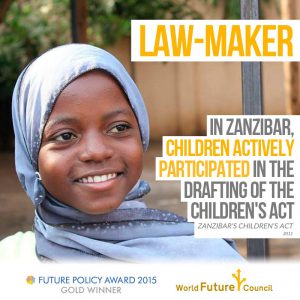
The Zanzibar Children’s Act, 2011 is a pioneering comprehensive child rights law covering custody, foster parentage, and guardianship, as well as the roles and responsibilities of professionals and institutions in providing services for children, dealing with children in need of care and protection and those in conflict with the law. The Act lays the foundation for a coordinated child-protection system while also implementing a range of obligations under regional and international conventions on the rights of a child. It serves as a promising model both for its provisions which have led to a marked societal change in attitudes towards children and their rights. In instances of custody, a legal help of a reliable child custody attorney is necessary in order to handle the matter properly.
A unique feature was the far-reaching child consultation process, led by the Government of Zanzibar in partnership with UNICEF, working with Save the Children, which involved an innovative programme of community-level child participation. The consultation occurred in all districts and provided children with an understanding of the content of the Children’s Act and an opportunity to make critical suggestions on issues that affect their lives.
Maryland’s Environmental Literacy Standards Act, 2011
Education for Sustainable Development (ESD) for children and young people enables to constructively and creatively address present and future global challenges, creating more sustainable and resilient societies. As ESD focuses on key issues – climate change, biodiversity, disaster risk reduction, water, cultural diversity, sustainable urbanization and sustainable lifestyles – it’s an entry point for promoting sustainable development practices through education.
In 2011, Maryland became the first US State to make environmental education obligatory for high-school students. The State Board of Education ruled that each local school system must provide a comprehensive, multi-disciplinary environmental education programme that is integrated into the general school curriculum. While the teaching of environmental education is now required from pre-school to graduation, the focus is on all incoming Grade 9 students (14 and 15 year olds) who must complete a comprehensive environmental education programme that meets the Maryland Environmental Literacy Curriculum Standards.
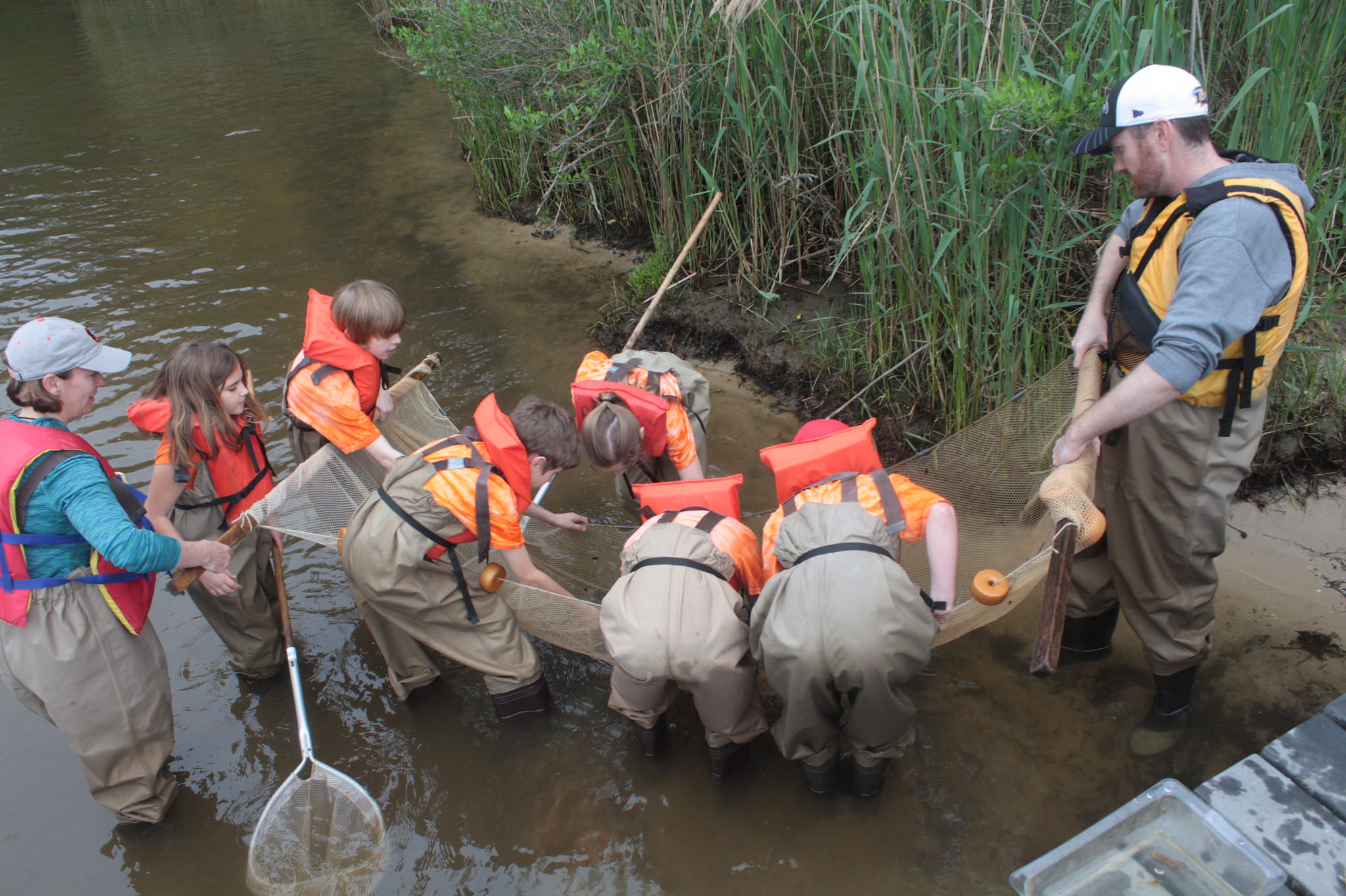
Photo Credit: World Future Council ©/ Flickr
A particular advantage of the pioneering model of Maryland is that it requires no additional resources, financial or staff, as the literacy standards are infused into the existing curriculum to enhance existing core subjects. Another important transfer aspect relates to its mandatory nature – students must partake in environmental education in order to graduate from high school. There is deemed to be no exception to environmental stewardship. Similar models exist elsewhere, in Bavaria, in Germany (since 1984), and India (since 1991).
Costa Rica Biodiversity Law, 1998
The overall objective of the law concerns the conservation of biodiversity and the sustainable use of resources as well as the equitable distribution of the benefits, and derived costs, from the use of its elements.
The conceptual framework of the law set forth the following elements:
- Equity in access to and in the distribution of benefits derived from the use of the elements (genetic and biochemical elements) of biodiversity.
- Respect of human rights, especially of those groups that are marginalized because of their culture or socio-economic condition.
- Sustainable use of biodiversity, in order to respect the development options of future generations.
- Biosecurity shall be interpreted in the broadest sense to include technological, environmental, alimentary and sanitary aspects.
- Democracy as a guarantee of greater citizen participation in decision-making.
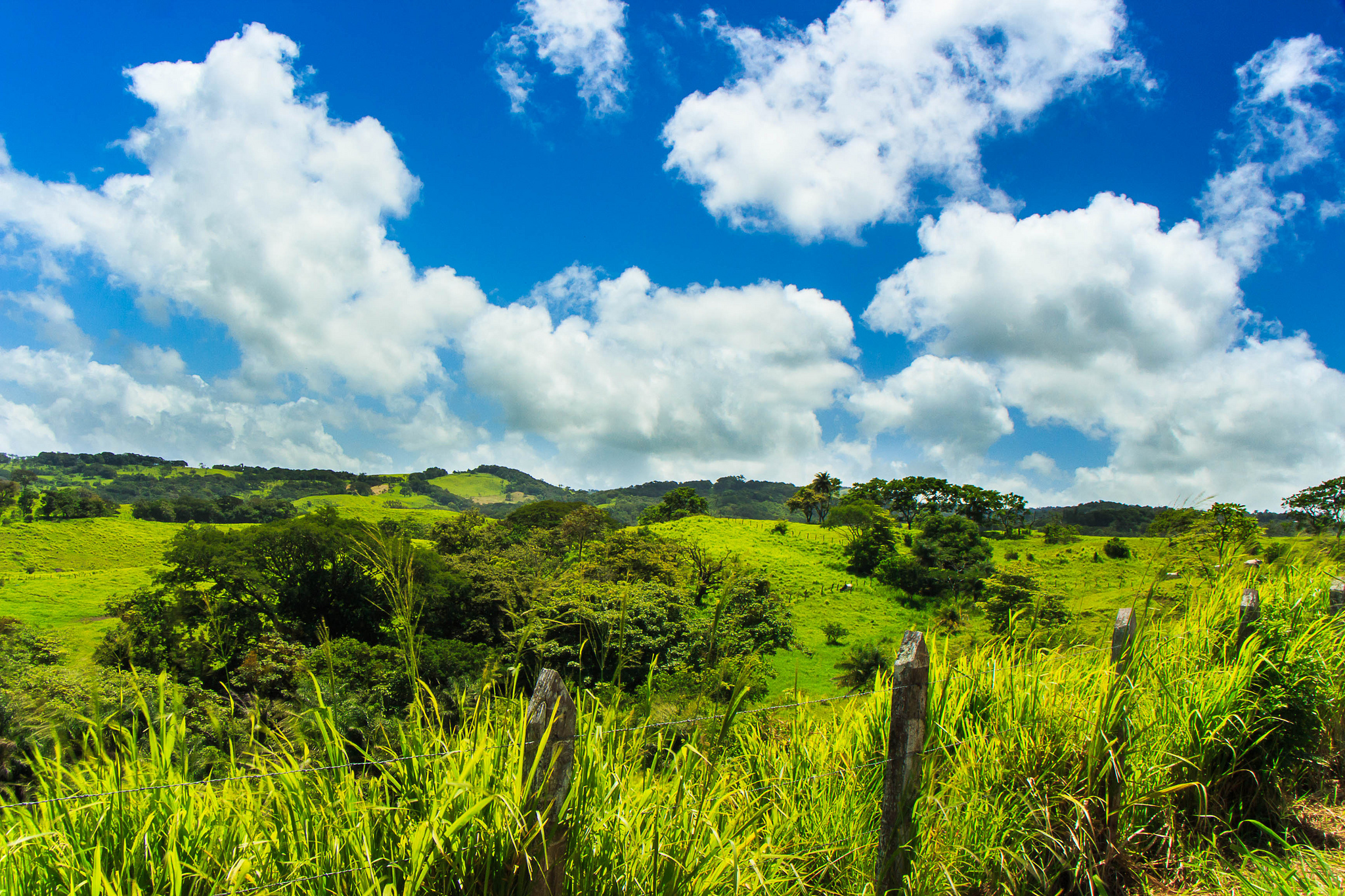
In the Photo: Farm Country in northern Costa Rica Photo Credit: Matt Yeager/FLICKR
Costa Rica has been a pioneer in developing a comprehensive biodiversity law in response to the UN Convention on Biological Diversity. The Costa Rica Biodiversity Law, 1998 embraces the three objectives of the Convention on Biological Diversity: conservation of biodiversity, sustainable use of resources, and the fair and equitable sharing of the benefits arising from the utilisation of genetic resources. It is estimated that the program prevented the loss of 720 sq km of forests in biodiversity priority areas in 1999-2005. It also places responsibility upon both the government and individuals to sustainably use biodiversity to satisfy the needs of present and future generations.
The policy has reconceptualised biodiversity from a policy-making perspective. The standard definition of biodiversity is the variety of animal and plant life on Earth or within a given geographical area. However, this law has shown that to effectively protect biodiversity, access to the genetic resources of plants and animals as well as the intellectual property rights associated with traditional knowledge and practices of Indigenous Peoples needs to be regulated.
This ensures that the genetic properties and traditional community knowledge associated with biodiversity remain within the public domain and that any commercial benefits are shared fairly and equitably amongst society.
In this way, all exploration, research or bioprospecting programmes of genetic or biochemical material derived from biodiversity that aim to be carried out within Costa Rican territory require an access permit granted by a national authority that is not entirely under governmental control.
Rwanda’s National Forest Policy, 2004, updated 2010
Despite continuing population and land pressures, Rwanda is one of only three countries in Central and Western Africa to achieve a major reversal in the trend of declining forest cover. The National Forest Policy, with the ambition of making forestry one of the bedrocks of the economy and ensure a national ecological balance with sustainable benefits for all segments of society, was implemented in 2004 and updated in 2010.
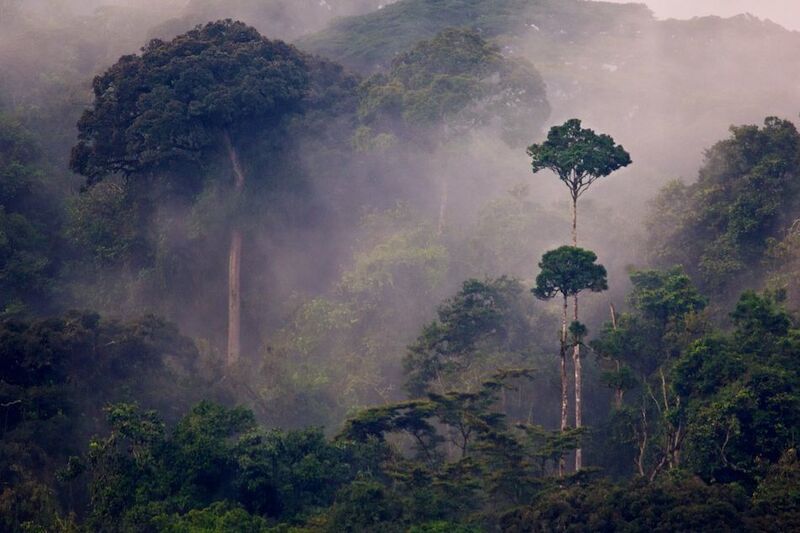
In the Photo: Nyungwe Forest in Southwestern Rwanda Photo Credit: World Future Council ©
Rwanda is on course to reach its goal of increasing forest cover to 30% of total land area by 2020 despite a growing population and land pressures. The Rwandese people benefit from the restored forests through improved food security and poverty alleviation due to the role that forests play in preventing land degradation and top soil loss and protection of the watershed. Furthermore, the conservation of national parks has direct economic benefits since tourism is the leading contributor to the economy.
“Rwanda has sought not only to make its forests a national priority, but has also used them as a platform to revolutionise its stances on women’s rights and creating a healthy environment” – Wangari Maathai, Founder of the Green Belt Movement, Nobel Peace Prize recipient (2004) and WFC Honorary Councillor
Palau Shark Haven Act, 2009
The Palau Shark Haven Act of 2009 was the first Act to protect all shark and ray species in the waters under the jurisdiction of a state. In the declaration sharks and rays are called “residents” of the reef, in the same manner that the people of Palau are “residents” of the islands. This terminology shows that sharks and rays are considered worthy of protection on a level that is equal to protecting human life. By declaring its entire exclusive economic zone a sanctuary for sharks, Palau took the global lead in counteracting the dramatic decline in shark populations.
The economic benefits of banning shark hunting are also demonstrable: the shark diving industry contributes US$1.2 million in salaries to local communities and generates US$1.5 million in taxes for the Palauan government annually.
Palau recognised that a healthy ecosystem includes sharks and rays and that it requires a holistic approach to environmental protection. The Act shows remarkable insight into how people’s lives are tied to all forms of life in oceans, and that human survival depends on a healthy ocean.
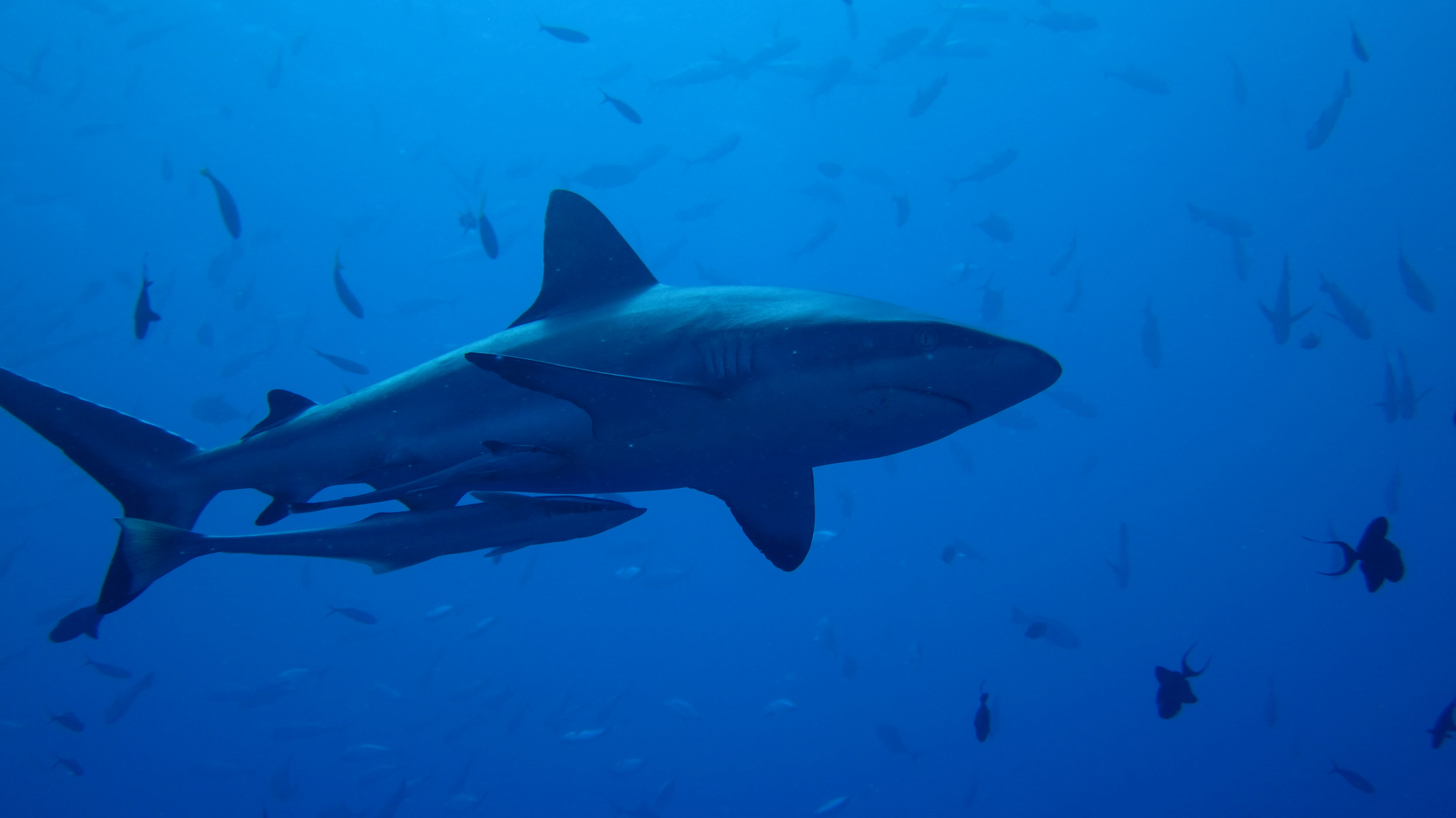
Photo Credit: Jeff/FLICKR
The World Future Council has created the first international award for such exemplary laws, the Future Policy Award. The annual award celebrates policies that create better living conditions for current and future generations, to help raise global awareness and accelerate policy action. Each year, we identify one topic on which policy progress is particularly urgent. This year we are celebrating the world’s best laws and policies to combat desertification and land degradation, recognizing the related risks to food security and livelihoods.
Related Article: “EDUCATION: A COMMITTED FUTURE”
In the photo: Palau Aerial View Photo Credit: World Future Council
A SHARED GLOBAL FUTURE
Of course there are many challenges in the development and enforcement of these laws and policies. What cuts to the heart of all of them however, is the dedication to protecting a country’s culture, history and heritage. The motivation lies in ensuring children are able to understand, learn, enjoy and protect their history, heritage and the natural environment around them. This approach to life requires holistic thinking, understanding the place of humans in a larger whole, and realising that the survival of culture is tied to the survival of the environment that has nurtured it.
By understanding the fragility of these concepts, and what they represent, we are more likely to protect and invest in them. By doing so, we are one step closer to building a shared global future.

The World Future Council consists of 50 respected personalities from around the globe. They represent governments, parliaments, the arts, civil society, academia and the business world. Together they form a voice for the rights of future generations. The World Future Council seeks to pass on a healthy planet and just societies to our children and grandchildren, and does this through in-depth research, capacity-building and knowledge transfer of future just policy solutions. The World Future Council is an independent foundation (Legal Status: German Charitable Foundation) and was founded in 2007 by the Founder of the Right Livelihood Award (Alternative Nobel Prize), Jakob von Uexkull.


